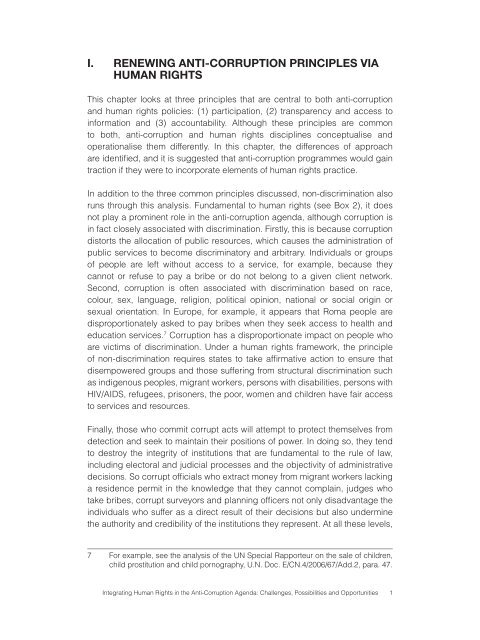Integrating Human Rights in the Anti-Corruption Agenda - The ICHRP
Integrating Human Rights in the Anti-Corruption Agenda - The ICHRP
Integrating Human Rights in the Anti-Corruption Agenda - The ICHRP
You also want an ePaper? Increase the reach of your titles
YUMPU automatically turns print PDFs into web optimized ePapers that Google loves.
I. Renew<strong>in</strong>g <strong>Anti</strong>-<strong>Corruption</strong> Pr<strong>in</strong>ciples via<br />
<strong>Human</strong> <strong>Rights</strong><br />
This chapter looks at three pr<strong>in</strong>ciples that are central to both anti-corruption<br />
and human rights policies: (1) participation, (2) transparency and access to<br />
<strong>in</strong>formation and (3) accountability. Although <strong>the</strong>se pr<strong>in</strong>ciples are common<br />
to both, anti-corruption and human rights discipl<strong>in</strong>es conceptualise and<br />
operationalise <strong>the</strong>m differently. In this chapter, <strong>the</strong> differences of approach<br />
are identified, and it is suggested that anti-corruption programmes would ga<strong>in</strong><br />
traction if <strong>the</strong>y were to <strong>in</strong>corporate elements of human rights practice.<br />
In addition to <strong>the</strong> three common pr<strong>in</strong>ciples discussed, non-discrim<strong>in</strong>ation also<br />
runs through this analysis. Fundamental to human rights (see Box 2), it does<br />
not play a prom<strong>in</strong>ent role <strong>in</strong> <strong>the</strong> anti-corruption agenda, although corruption is<br />
<strong>in</strong> fact closely associated with discrim<strong>in</strong>ation. Firstly, this is because corruption<br />
distorts <strong>the</strong> allocation of public resources, which causes <strong>the</strong> adm<strong>in</strong>istration of<br />
public services to become discrim<strong>in</strong>atory and arbitrary. Individuals or groups<br />
of people are left without access to a service, for example, because <strong>the</strong>y<br />
cannot or refuse to pay a bribe or do not belong to a given client network.<br />
Second, corruption is often associated with discrim<strong>in</strong>ation based on race,<br />
colour, sex, language, religion, political op<strong>in</strong>ion, national or social orig<strong>in</strong> or<br />
sexual orientation. In Europe, for example, it appears that Roma people are<br />
disproportionately asked to pay bribes when <strong>the</strong>y seek access to health and<br />
education services. <strong>Corruption</strong> has a disproportionate impact on people who<br />
are victims of discrim<strong>in</strong>ation. Under a human rights framework, <strong>the</strong> pr<strong>in</strong>ciple<br />
of non-discrim<strong>in</strong>ation requires states to take affirmative action to ensure that<br />
disempowered groups and those suffer<strong>in</strong>g from structural discrim<strong>in</strong>ation such<br />
as <strong>in</strong>digenous peoples, migrant workers, persons with disabilities, persons with<br />
HIV/AIDS, refugees, prisoners, <strong>the</strong> poor, women and children have fair access<br />
to services and resources.<br />
F<strong>in</strong>ally, those who commit corrupt acts will attempt to protect <strong>the</strong>mselves from<br />
detection and seek to ma<strong>in</strong>ta<strong>in</strong> <strong>the</strong>ir positions of power. In do<strong>in</strong>g so, <strong>the</strong>y tend<br />
to destroy <strong>the</strong> <strong>in</strong>tegrity of <strong>in</strong>stitutions that are fundamental to <strong>the</strong> rule of law,<br />
<strong>in</strong>clud<strong>in</strong>g electoral and judicial processes and <strong>the</strong> objectivity of adm<strong>in</strong>istrative<br />
decisions. So corrupt officials who extract money from migrant workers lack<strong>in</strong>g<br />
a residence permit <strong>in</strong> <strong>the</strong> knowledge that <strong>the</strong>y cannot compla<strong>in</strong>, judges who<br />
take bribes, corrupt surveyors and plann<strong>in</strong>g officers not only disadvantage <strong>the</strong><br />
<strong>in</strong>dividuals who suffer as a direct result of <strong>the</strong>ir decisions but also underm<strong>in</strong>e<br />
<strong>the</strong> authority and credibility of <strong>the</strong> <strong>in</strong>stitutions <strong>the</strong>y represent. At all <strong>the</strong>se levels,<br />
<br />
For example, see <strong>the</strong> analysis of <strong>the</strong> UN Special Rapporteur on <strong>the</strong> sale of children,<br />
child prostitution and child pornography, U.N. Doc. E/CN.4/2006/67/Add.2, para. 47.<br />
<strong>Integrat<strong>in</strong>g</strong> <strong>Human</strong> <strong>Rights</strong> <strong>in</strong> <strong>the</strong> <strong>Anti</strong>-<strong>Corruption</strong> <strong>Agenda</strong>: Challenges, Possibilities and Opportunities

















